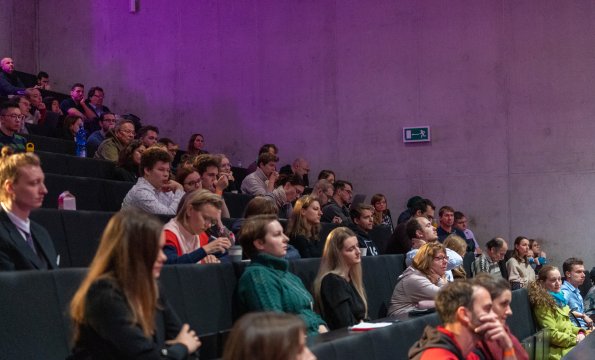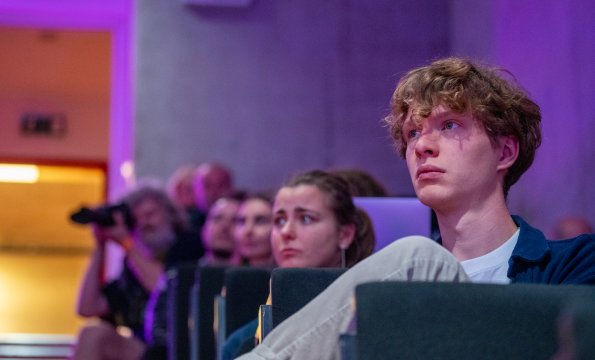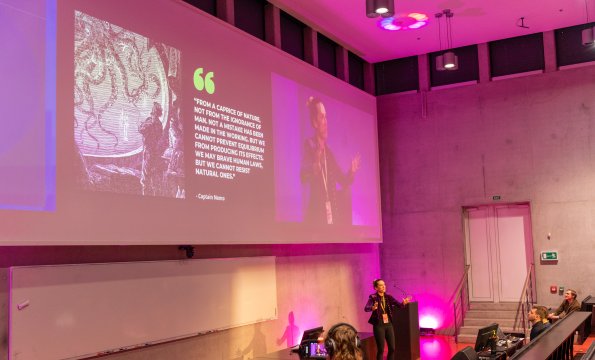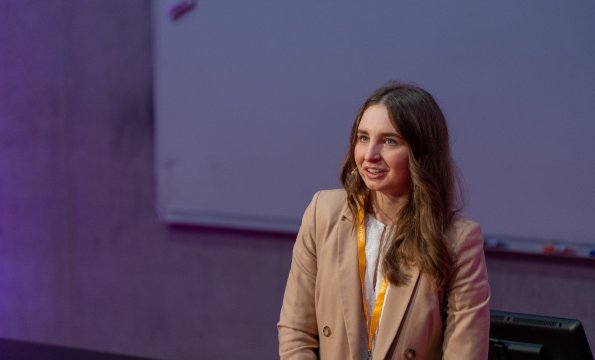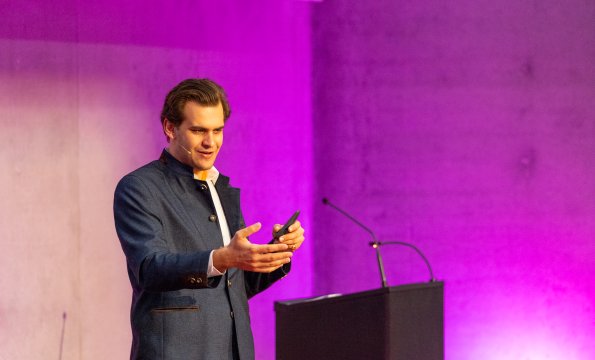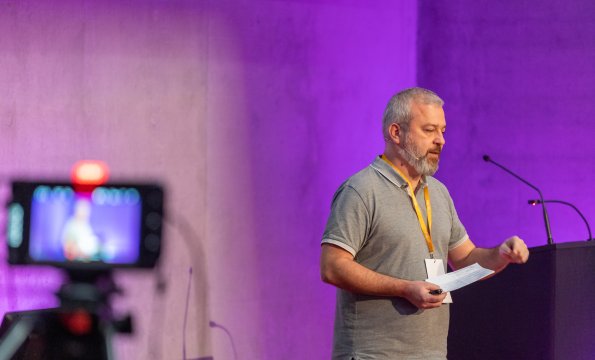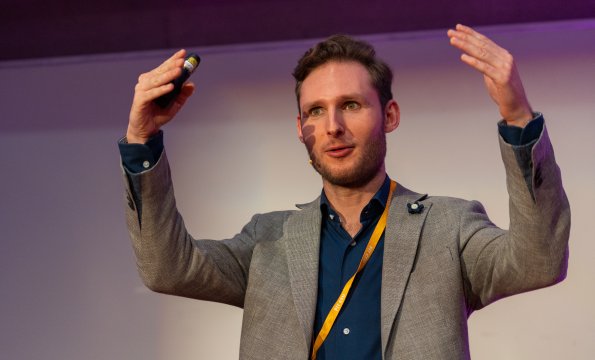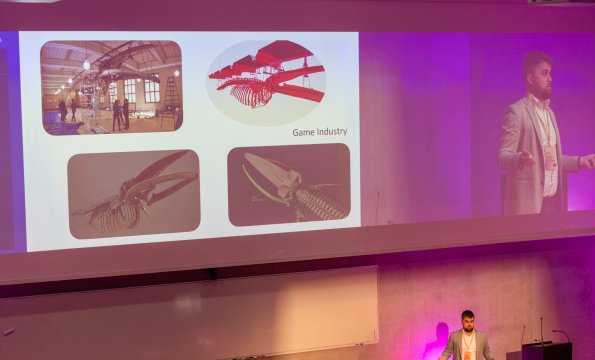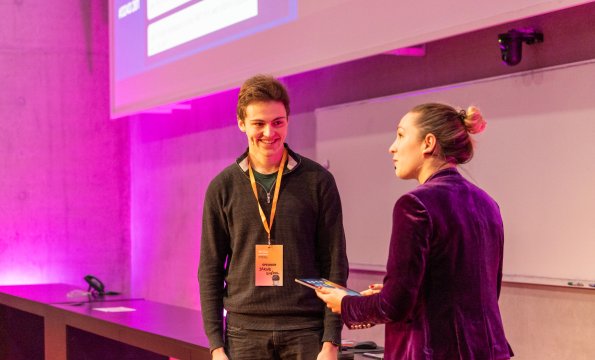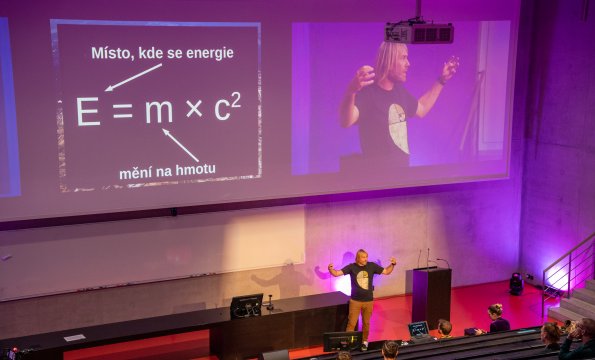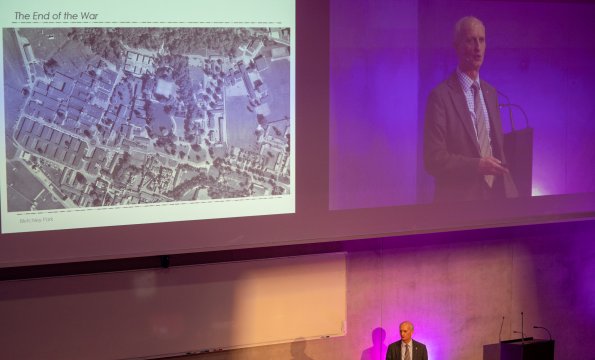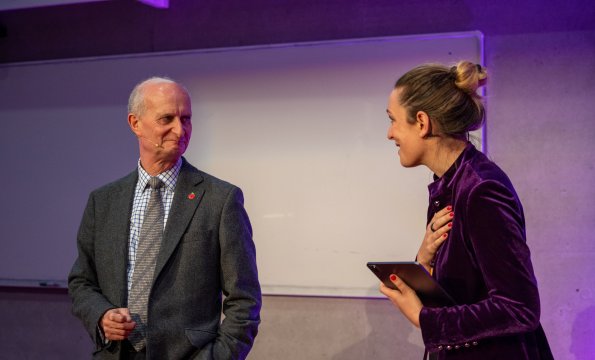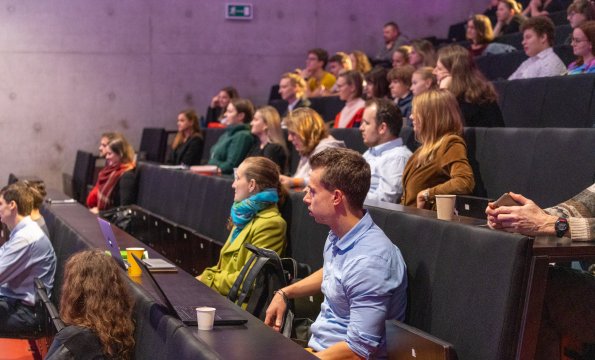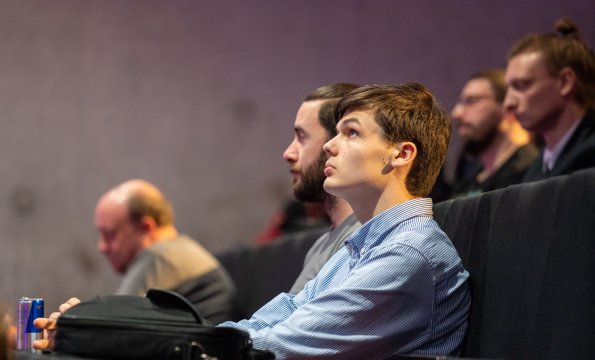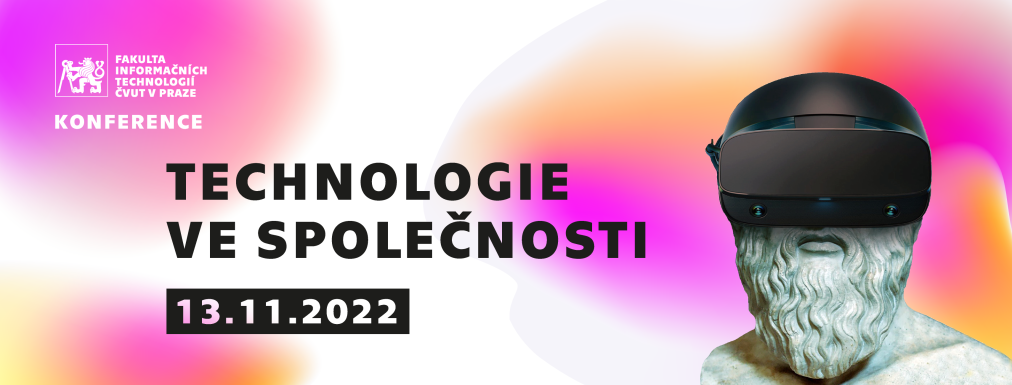
Konference Technologie ve společnosti vám přiblíží rozmanité aspekty lidské společnosti – od lékařství přes finance až po vzrušující technologie zabývající se AI nebo blockchain. To vše prožijete společně s našimi akademickými kolegy a průmyslovými partnery.
O konferenci
Jakou historickou roli hrají technologie ve formování společnosti?
Svět kolem nás je komplikovaný – krize, války, schizofrenie identity společnosti. Nejsme ani zdaleka první vlna lidstva, která se problematikou společenské komplexity zabývá. Jsme ale první vlna lidstva, která má k dispozici nejmodernější technologie, díky nimž můžeme pochopit, proč se chováme tak, jak se chováme.
Za tímto záměrem vznikla na FIT ČVUT výzkumná skupina CCHAOS (Cloud Civilisations, Honest, and Optimised Systems), která má za cíl multioborově zkoumat fenomény společenské komplexity.
Záznam konference
Program
Blok 1
9:00 Doors open a registrace
 9:45 Zahájení a představení výzkumné skupiny CCHAOS
9:45 Zahájení a představení výzkumné skupiny CCHAOS
Anotace
Jsme interdisciplinární tým odborníků z oblasti IT a společenských věd. Zkoumáme komplexní společenské systémy za využití moderních technologií se zvláštním důrazem na mezilidské interakce ve virtuálním prostředí. Chceme využívat digitální (re)konstrukce a virtuální reality i pokročilé nástroje sběru a analýzy dat k hlubšímu porozumění člověku 21. století. Hlavním výzkumným záměrem skupiny je realizace projektu Politeia 21, jehož cílem je vytvořit co nejvěrnější simulaci života v „ideální společnosti“.
Jakub Šenovský, Tomáš Houdek, Sara Polak (FIT ČVUT)
 10:30 Kultura, blockchain a digitální zachování minulosti
10:30 Kultura, blockchain a digitální zachování minulosti
William Lobkowicz (House of Lobkowicz)
 11:00 Komplexita vesmíru
11:00 Komplexita vesmíru
Anna Rojková (Huld)
 11:30–12:30 Oběd
11:30–12:30 Oběd
Blok 2
 12:45 Ministr Zdraví a co je špatně na českém zdravotnickém systému
12:45 Ministr Zdraví a co je špatně na českém zdravotnickém systému
Anotace
We have an official Ministry of Health, so why do we need an “alternative” – the Ministry of Soundness, an advocacy NGO with the aim to contribute to necessary changes which must happen in the Czech healthcare system? Our answer is yes. Czechia is still particularly good in terms of general accessibility and quality of care; however, inside, we see system troubles with the potential to grow and negatively impact the healthcare system. Today in every industry or area of people’s activity, we measure the impact, we want to see data about effectivity, and we ask if a client is happy with what he/she has received. So why don’t we do so in the healthcare system into which we as a society pour almost 500 billion/year. The system generates tons of data on every level, so why nobody really uses them, why key strategic decisions are not data-based and why all the data are not transparently and generally accessible by anybody interested?
Pavel Gruber (Ministr Zdraví)
The Director of the advocacy NGO Ministry of Soundness (Ministr Zdraví) had graduated from the Faculty of Social Sciences at Charles University in Prague, specializing in international relations. He has served for almost 10 years as a director of Doctors without borders in Czechia. Before this, he worked as a humanitarian and development director at Caritas. Pavel participated in field missions, to name a few – Indonesia, Haiti, or Ukraine. He was the Chairman of the Board of the Czech Forum for Development Cooperation and Board member and one of the co-founders of MSF SITS. Pavel also spent some years in the commercial sector or worked as a campaign manager during general elections. His last missions were related to covid and Ukraine.
 13:15 Deloitte Xperience Lab: Imagination For an Inspired Future
13:15 Deloitte Xperience Lab: Imagination For an Inspired Future
Anotace
In the past 2 years, technology has boomed with opportunities to work and learn in a more hybrid way. With so many emerging possibilities, it’s not always easy to navigate your organization into this promising future. This is why Deloitte created the Xperience Lab, where business leaders can immerse themselves in the emerging futures of their industry and gain a better understanding of what’s possible. Thomas De Bruyne, Xperience Lab Lead at Deloitte, will share about his journey into the future and how he encourages businesses to start taking the first steps.
Thomas de Bruyne (Deloitte)
As an organizational psychologist and tech optimist, Thomas’s passion is to co-create a Future of Business that provides people with healthy platforms to thrive in the community. He strongly believes in solid education and courageous leadership as cornerstones of a thriving world. Virtual reality is his favorite gateway into shifting leadership consciousness and accelerating learning. He is also actively looking into other areas of innovation where psychology meets technology. His sweet spot is in topics such as VR, consciousness, biosensing & neuroscience, flow states, psychological safety, sleep, art, dreaming,… Leading the Xperience Lab at Deloitte, he provides (aspiring) leaders with immersive experiences around the emerging futures for their industry. The Lab is built on the belief that leaders make better investment decisions from a deep-felt understanding of emerging tech, allowing them to create a healthier Future of Business. As Co-Chair for the Transformative Tech community in the Czech Republic, he connects people and ideas around technology’s potential to accelerate leaps in consciousness for many.
 13:45 Um pro muzeum aneb nejsme jen lapači prachu!
13:45 Um pro muzeum aneb nejsme jen lapači prachu!
Anotace
Muzea mají obvykle u širší veřejnosti statut staré, konzervativní a prachem zaprášené instituce. Není se čemu divit a mnohdy je nutné dát jim za pravdu.
Ivo Macek (Přírodovědecké muzeum, Národní muzeum)
Absolvoval jsem Univerzitu Tomáše Bati ve Zlíně obor Marketing a management a zároveň Masarykovu univerzitu v Brně obor Geologie. Od roku 2011 pracuji v Národním muzeu, kde jsem začínal jako výzkumný a vývojový pracovník v laboratoři elektronové mikroskopie. Poté jsem v roce 2015 vyhrál výběrové řízení na pozici ředitele a stal se tak historicky nejmladším ředitelem největšího přírodovědeckého muzea v České republice. Muzeum, které ve svých útrobách uchovává 15 milionů sbírkových předmětů starých od několika miliard let až po pár dní. V letech 2016–2022 jsem byl hlavním projektový manažer a idea maker pro největší muzejní výstavní projekt jaký se kdy v ČR realizoval (Zázraky evoluce a Okna do pravěku) s rozpočtem 250 milionů Kč a plochou více než 3 000 m2. Od roku 2023 nastupuji jako ředitel do Muzea hlavního města Prahy.
 14:15 Cognitive chaos and decentralized science
14:15 Cognitive chaos and decentralized science
Anotace
The talk is an introduction to active inference and decentralized science. We discuss the link between active inference, neuroscience, AI, and chaotic systems. Then we move on to a brief introduction to DeSci and the engineering practices that make it an exciting field for rethinking scientific organization. We conclude with an overview of how we can merge active inference and DeSci for a cognitive design of transparent epistemic organizations.
Jakub Smékal (Durham University)
I am a student researcher working at the intersection of AI, neuroscience, and Web3. I am developing tools for the decentralized AI economy at Algovera and am researching computational applications of active inference for cognitive complex systems design at the Active Inference Institute. I am also involved in decentralized science with my work on token engineering for the knowledge commons at OpSci.
 14:45–15:15 Přestávka
14:45–15:15 Přestávka
Blok 3
 15:30 Malé a velké třesky na LHC
15:30 Malé a velké třesky na LHC
Anotace
Krátce po Velkém třesku byl vesmír tvořen velmi horkou a hustou hmotou složenou z kvarků a gluonů, elementárními částicemi, které jsou spolu s elektrony základní stavební prvky hmoty kolem nás. Tuto kvark-gluonovou polévku lze připravit ve srážkách na výkonných urychlovačích, jako je například LHC v laboratoři CERN. Budeme spolu putovat zpět v čase až do mikrosekund po Velkém třesku a dozvíte se, jak tyto experimenty fungují a jak tuto extrémně horkou hmotu vytváříme a zkoumáme v laboratoři.
Martin Rybář (CERN a Univerzita Karlova)
Martin v současné době působí jako stipendista Marie Skłodowska-Curie na Univerzitě Karlově v Praze, kde získal i doktorát z částicové fyziky. Dříve pracoval jako postdoktorand na University of Illinois a na Columbia University v New Yorku. Vede skupinu těžkých iontů na experimentu ATLAS v CERNu a zkoumá hmotu která existovala krátce po velkém třesku. Rád popularizuje vědu: organizoval školy astronomie a přednáší studentům a široké veřejnosti. S několika kamarády založil projekt „Science to Go“, který se snaží formou krátkých přednášek popularizovat různá vědecká témata.
 16:00 Keynote speech: The Rise, Fall, and Rise Again of Bletchley Park
16:00 Keynote speech: The Rise, Fall, and Rise Again of Bletchley Park
Anotace
During World War Two, Bletchley Park became the top-secret home of the Government Code and Cypher School, the UK’s codebreakers (and the predecessors of today’s GCHQ). Expanding from a couple of hundred personnel in 1939 to nearly 9,000 by 1945, this organisation undertook incredible work producing intelligence that had a profound impact on the outcome of the War. After the War, Bletchley Park became home to a variety of government organisations, but its wartime role remained secret. In 1989, as it was about to be demolished, a campaign was successfully mounted to save the site. Today it is a museum and vibrant heritage attraction open to the public and welcoming over 250,000 visitors a year from around the world. This illustrated talk will outline how Bletchley Park grew during the War, its decline to near dereliction post-War, and its rebirth as an award-winning museum and heritage attraction.
Iain Standen (Bletchley Park)
Iain Standen has been the CEO of the Bletchley Park Trust since January 2012. He has led Bletchley Park through a major transformation, restoring and regenerating many of its wartime buildings and creating evocative exhibitions about the role of Bletchley Park during World War Two. Prior to Bletchley Park, he served for 28 years as a commissioned officer in the British Army, working in the communications and intelligence fields. He served in the United Kingdom, Germany, and Cyprus and on operational deployments in Northern Ireland, Saudi Arabia, Rwanda, Bosnia, and Iraq. He gained his first degree, a BA in Geography, from King’s College London in 1985 and has since completed an MA in Military Studies from Cranfield University and an MA in Military History from the University of Buckingham. Iain has a lifelong interest in history and heritage and has been an active battlefield guide for over 25 years.
 17:30 Debata: Existuje objektivní moralita?
17:30 Debata: Existuje objektivní moralita?
Pro: Vojtěch Hlaváček, Kryštof Jarmar (BrainWeAre)
Vojtěch i Kryštof vystudovali biologii na PřF UK a nadchli se do fungování a tajů lidského mozku. Založili projekt Brain We Are, který se snaží popularizovat vědu a vzdělávat o jejím praktickém využití v každodenním životě. Brain We Are za 4 roky fungování nasbíralo téměř přes 200 epizod a 2,5 milionu poslechů.
Proti: Tomáš Mikolov (CIIRC), Tomáš Houdek (CCHAOS)
19:00 Ukončení konference
Vstupenky
Pokud vás zajímají technologie, věda, kultura a chcete získat nový náhled na naši společnost, pak na této konferenci nesmíte chybět! Vstup na akci je zdarma po předchozí rezervaci. Vhodné pro akademiky, studenty a širokou veřejnost.

